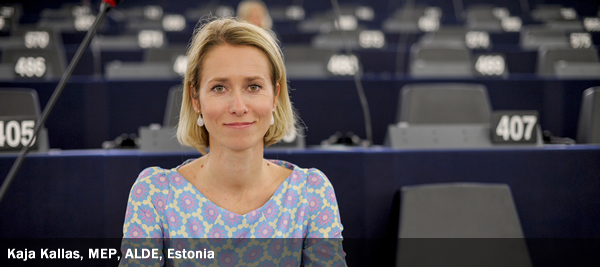
Before starting work in the European Parliament, I never thought about whether Estonia was somehow more advanced in digital issues than the rest of Europe, writes Kaja Kallas, MEP (ALDE, EE). To be honest, I never even thought about the digital solutions that I was using daily because I was so used to them. The truth is, we only treasure things when we don’t have them anymore – here I quickly understood that the rest of Europe is lagging far behind us.
This is why I decided to get involved in digital issues in the European Parliament. I have noticed that in European discourse digital services are often associated with various fears, whereas we should rather place the emphasis on how much Europe has potential for development here.
Looking To America
When talking about digital issues in Europe, we often try to address the U.S. Politicians’ call to create Europe’s own Google, Facebook or Silicon Valley. At the same time, however, we should focus on the strengths that we already have in Europe such as well-developed industry and highly educated people full of ideas of how to improve digital solutions and contribute to the development of technology by creating software.
In part, Europe’s problem has been that as soon as new ideas come to fruition, the developers go to the U.S., because it is easier to develop your ideas into big projects if you have better access to capital and a market with common rules. Once you get your foot in the door of the US market, you can potentially access 300 million consumers.
The European market with its 507 million people is far bigger, but a business set up in one Member State cannot automatically be operated in all 28 of them. When we think about the Internet and its nature, we see it as having no borders. Yet, by trying to regulate it, the member States have created a lot of artificial borders. Technically, selling online is very easy, but in Europe, only 7% of businesses sell cross-border.
The main problems are the different sets of rules, especially in consumer protection laws. For example, in one country you have to give a six-month warranty for your goods, in others the warranty period is two years and so on. If a small business has to choose whether to deal with all the ensuing bureaucracy, or to limit their activity to the domestic market, then many, unfortunately, choose the second option, as they have neither the time nor the resources to study and follow all the rules.
Europe’s economy is based on SMEs and therefore it is crucial for them to have more options for development. Better conditions mean more jobs and higher salaries. Small member states have a lot to win, as there is a big difference between selling your goods to 1,3 million versus 500 million people.
Fear of the New
So why is the digital single market moving forward so slowly? Why do we see such resistance? It seems to me that the unwillingness often stems from ignorance. If we associate digital solutions only with fears and threats, then the legislature’s first reaction is to ban. Such behaviour is already quite familiar to us from history.
Before the industrial revolution, the inventor of the weaving machine wanted his invention to have Queen Elizabeth I’s patent, but she, of course, said that such move would leave all her craftsmen unemployed. Neither did King James I give the patent. However, if a weaving machine is already invented, then sooner or later it will be put into operation. The time spent on fighting innovation should be used, instead, to identify potential problems and offer solutions to them.
In order to allow society to flourish, we must allow a certain degree of so-called creative destruction – we must have the courage to let go of old things. We will certainly lose some of our traditional jobs with the digital services taking over, but there will be new jobs in their place. According to a study by the World Bank, over half of today’s children will work in jobs that do not exist yet. We should create the best possible conditions for innovation in order to develop these new jobs.
Europe’s Missing Out
Europe’s fear of change has brought us to a point where we have already missed two Internet-related innovation waves. First, when large Internet and social media platforms like Google, Facebook, Amazon occurred, and the second when sharing economy solutions like Uber, Airbnb and BlaBlaCar took over. We should not miss the third wave that brings us technological innovation by using big data, the Internet of Things and machine to machine communication.
After all, there is no better tool for overcoming our fears, than to start using these technologies and applications, and learn how they work. Studies show that trust in cross-border online purchases jumps to 80% among those with previous experience of cross-border online shopping – much higher than it is among people with no such experience. So, people only start to trust after their first purchase. The same principle applies to the use of sharing economy platforms.
It seems to me that the courage to take risks is significantly lower among European legislators than it is among European citizens. If the legislator indicates that digital solutions are dangerous and complicated, and so they must be banned in order to protect the traditional sectors, it also gives a signal that there is no point in investing in these new sectors, because that would bring too much trouble. This is why it is, then, that innovative solutions are moving elsewhere, and we have to acknowledge that the main benefits of these solutions will not come to Europe.